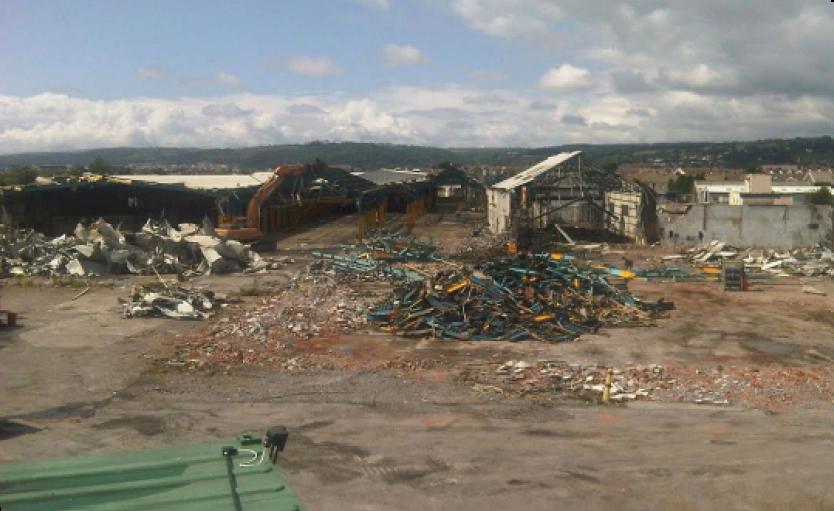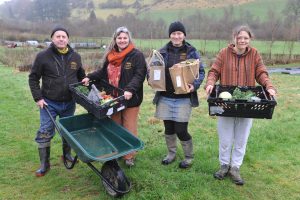REBECCA EVANS AM – Deputy Minister for Farms and Food, visited the Haverfordwest Creamery to better understand the challenges facing the dairy sector and the plans that farmer-owned First Milk have in place for the future.
Haverfordwest Creamery processes the milk from nearly 300 local dairy farmers, who are all co-owners of the factory and located within a radius of 50 miles.
After completing a factory tour, which included speaking with local employees and a local farmer representative, the Deputy Minister said:
“In the last 12 months we have witnessed volatility and low prices in dairy markets around the world, which has had a direct impact on family farms across Wales. We are working closely with the industry, through our Dairy Task Force, to increase the demand and add value for Welsh milk and milk products.
“I believe that well-invested farmer-owned facilities, such as this creamery in Haverfordwest, are vital to the long-term vision of an efficient and sustainable dairy sector in Wales. One which delivers benefits for the wider rural economy.”
First Milk’s site director at the creamery, Paul Rowe commented: “Haverfordwest Creamery creates approximately £70 million of economic activity per year in West Wales. It processes over 260 million litres of local milk and turns it into 28,000 tonnes of award-winning cheeses, with over 100 local people employed in our cheese making and distribution operations.
“Haverfordwest Creamery is one of the most efficient in the UK and a large proportion of the investments we have made, over the last few years, have only been possible with the support of the Welsh government.
“Dairy markets are very tough right now and dealing with this is our immediate priority. However over the longer-term we firmly believe that the Haverfordwest Creamery is well placed to take advantage of the growing global demand for dairy products. We will continue to work closely with the Welsh government in developing these opportunities for the benefit of our local farming members and owners.”
Addressing the annual DairyCo conference at the University of Aberystwyth the following day (Friday, March 6), Rebecca Evans, announced the completion of the Welsh Dairy Review.
In October, the Deputy Minister announced she was commissioning an independent review of the Welsh dairy sector. She asked Andy Richardson, a member of the Dairy Task Force for Wales, to lead the review, which was commissioned in response to difficulties faced by dairy farmers last autumn, as well as an opportunity to review the voluntary code which had been in operation for two years.
She recently received the final report from Mr Richardson, who categorised his recommendations under five key headings: Leadership, Market Focus, Efficiency, Knowledge and Skills and the Environment.
The Deputy Minister said: “One of the things that has particularly concerned me about the recent cut in the price of milk is the impact on confidence and the possible knock-on effect this could have on investment within the sector.
“Andy Richardson’s review suggests that the mood, both amongst farmers and processors, may be more positive than perhaps is being portrayed and that is good news – without continued investment the future will look very bleak.
“As the price paid for milk continues to fall, many farmers and processors in Wales continue to operate under extremely challenging conditions on a daily basis, as the industry faces a very difficult period, one fundamentally driven by an over-supply.
“I am however confident there is a secure and profitable future for dairy in Wales. As I have said many times before, we have the land, the animals, the labour and the infrastructure. Evident from Andy’s review is that we also have the commitment, the passion and the willingness to change and to adapt that will see us through our current difficulties.
“It is so important to me that we continue to support the sector by taking on board the views of those working within it, and help to grasp the opportunities that exist.
“Following discussions with farmers and processors across Wales, Andy has been able to provide a vision of the future for the whole of the dairy sector which sets the direction for a more sustainable industry in the future.
“I would like to thank Andy for his work, undertaken in such a short period of time. I expect to publish the report, alongside the Welsh Government’s formal response, in the form of an action plan once I have given it due consideration.”
The Dairy Review was intended to draw on the work already undertaken by the Dairy Task Force but looked wider, taking views from all parts of the supply chain. It also considered what support the RDP 2014 – 2020 may provide to dairy farmers and the milk processing sector in Wales.
Meanwhile at Carmarthenshire’s recent NFU-Cymru conference, NFU President Meurig Raymond assured union members that the NFU was doing it all it can to assist its milk producing members get through the current price volatility when he spoke at the recent Carmarthenshire NFU Cymru conference.
Mr Raymond explained helping farmers within the milk industry was the Union’s top priority at present. He said he has met with the leading banks to ask them to help farmers at this difficult time. He has met with Government to discuss tax concessions. They’ve given evidence to the Efra Committee asking for more powers to the Groceries Code Adjudicator. The NFU has spoken to milk buyers, particularly First Milk. Mr Raymond also told those present how he has personally had some very difficult meetings with the major retailers and has had some assurances that they will stock more British dairy products in the future.
Mr Raymond said, “We are grateful to shoppers for the positive messages we’ve received as dairy producers and pleased that so many consumers have come out and backed British dairy farmers at this time. We’ve been inundated on social media in particular by shoppers wanting to know where they should buy their dairy products to help us most. In response we have said that shoppers have to check the labels to make sure they are definitely buying British produce – not something that looks British. The Red Tractor mark is a good quick indicator. I would like to take this opportunity to thank the British public for all their support at this time.”
Market volatility hitting family farms















Add Comment